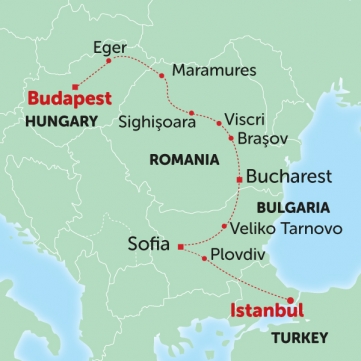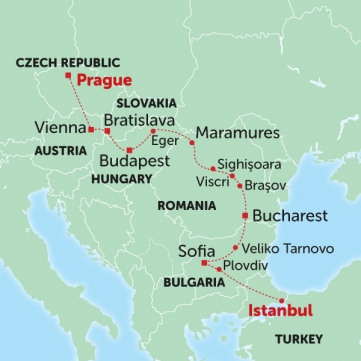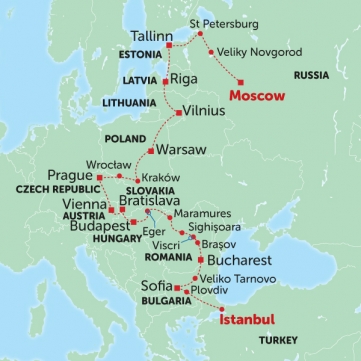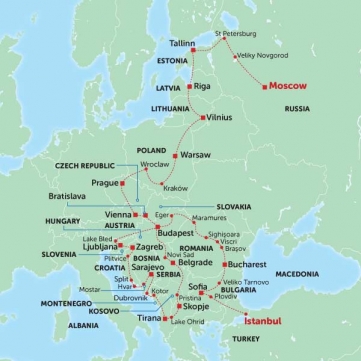Book NOW for $1 £1 €1 • Flexible Payments • No Change Fees • Private Departures Available
- Home >>
- Destinations >>
- Europe >>
- Turkey
Turkey Tours
Straddling two continents, Turkey offers a fascinating blend of European and Asian cultures. Steeped in Christian and Islamic history and shining with modern energy, our Turkey adventure tours offer access to some of the world’s most important ancient monuments and historic sites as well as some of the most exciting contemporary cities. You will also be able to discover the poignant Anzac battlefields of the Gallipoli Peninsula rank among the many highlights of a Turkey adventure tour. Cosmopolitan Istanbul is the jewel in the crown, numbering the Blue Mosque, Aya Sofia, the Church of Divine Wisdom, Sultanahmet mosque and Topkapi Palace among its star attractions.
When you need to unwind and be pampered during your Turkey adventure tour, find a hamam and enjoy a massage, take a relaxing cruise on the Bosphorous or dip your toes in the Mediterranean Sea on the Turquoise Coast where you’ll also find some fantastic nightlife. Of course a Turkey adventure tour will also show you the country’s warm hospitality and one of the world’s most aromatic cuisines.
All Tours of Turkey
4 Tours
Independently Verified Travel Reviews From Past Clients
Turkey Travel Guide
Turkey Travel Guide
Brief history
Present-day Turkey was created in 1923 from the Turkish remnants of the Ottoman Empire. In 1945 Turkey joined the UN, and in 1952 it became a member of NATO. Turkey intervened militarily on Cyprus in 1974 to protect Turkish Cypriots and prevent a Greek takeover of the island; the northern 37 percent of the island remains under Turkish Cypriot control. Relations between Turkey and Greece have improved greatly over the past few years. Politically, modern Turkey was almost entirely the creation of one man, Mustafa Ataturk.
Geography and weather
Turkey has borders with Greece, Bulgaria, Armenia, Georgia, Iran, Iraq and Syria with easy land and sea access to the Gulf States, Levant and North Africa. It is the ninth largest country in the Middle East and the third largest in Europe. Turkey only consists of 23,000 sq. km in Europe: the remainder is in Asia. The Sea of Marmara and the Bosphorus and Dardanelles straits separate the European (Thrace) and Asian (Anatolian) parts of Turkey. Anatolia is a high plateau region, rising progressively towards the east and broken by the valleys of some 15 rivers, including the Tigris and the Euphrates. There are numerous lakes including Lake Van, which is really an inland sea. In the north the chain of the Ponitine Mountains runs parallel to the Black Sea; in the south, the Taurus Mountains almost touch the narrow, fertile coastal plain. The climate is temperate with hot, dry summers and mild, wet winters (harsher in interior).
Visit www.worldclimate.com to get an idea of what the weather will be like on your tour.
Visas
Most nationalities (including citizens of the UK, Australia, Canada and the US) need a visa to enter Turkey. Citizens of these countries must obtain an electronic visa before arriving in Turkey which is valid for three months. The costs of the visa varies. Citizens of New Zealand currently are not required to purchase a visa on entry. We recommend you contact your local Turkish embassy or consulate near to your planned date of travel to obtain the latest information on your specific requirements.
Visa services like www.travcour.com can be very helpful.
Money
The monetary unit in Turkey is the lira, TL. For up to date exchange rates with your own currency visit www.oanda.com or www.xe.com.
Changing money, credit cards & ATMs
Rates for foreign currency are always better inside Turkey. Private exchange offices have competitive rates and no commission. Banks are generally open Monday – Friday 8.30am – noon and 1.30pm -5pm. Most charge a commission of US$2.50 for travellers cheques. ATMs are widely available in cities.
Tipping
Generally tipping is not an obligatory custom in Turkey, however tipping between 5-10% at local cafes and restaurants is recommended.
Local transport
In Istanbul many of the sights are within walking distance of each other and the best way to get to know the area is on foot. However, it’s easy and relatively cheap to jump in a taxi and criss-crossing the Bosporus by ferry is great fun.
Security
Most people find that Turkey is a safe and friendly country but as in any foreign place you should exercise a reasonable degree of caution. Don’t walk around lonely back streets at night (particularly in Istanbul), don’t wear expensive looking jewellery or a classy watch and don’t carry a wallet in your back pocket. Don’t carry your camera openly; always have it in a small day pack which is firmly attached to your body, preferably in the front in crowded places. Take particular care not to become too relaxed if you have had a few drinks and are returning to your hotel at night – it is best to always take a taxi. Always wear a money belt or leave your valuables, including your passport, in the hotel security box.
Local food and drink
Lots of tasty treats are available in Turkey. Snacks include borek or poca (small pastries filled with meat, cheese or potato) sold from snack carts in the street, also simit (sesame-seed bread rings). Other snacks are lahmacun (small pizzas with meat based toppings) and in coastal cities midye tave (deep fried mussels). Main meals include several variations of the kebab, fish and seafood are good, but usually pricey and sold by the weight rather than by the item. Most budget restaurants are alcohol free. A useful exception is a meyhane (tavern) which usually serves mezes, an extensive array of cold appetisers as well as grilled kebabs and fish. Most common mezes are dolma (pepper or vine leaves stuffed with rice) and patlican salata (aubergine in tomato sauce). The best dessert is undoubtedly the honey soaked baklava. Turkish delight - solidified sugar and pectin, flavoured with rose water or pistachios, and sprinkled with powdered sugar - is another popular sweet.
Drink
All drinks such as bottled water or soft drinks are at your own expense at all times and are fairly inexpensive. Water from a tap or well should not be considered safe to drink. Bottled water, carbonated soft drinks and fruit juices are widely available throughout the country. Alcoholic drinks vary in price, with beer generally being the cheapest option.
1l of water - $0.50
30cl bottle of soft drink - $0.50-$1
40cl bottle of beer - $2-$3
Turkish coffee is served in tiny cups, and can be very strong. The same can be said for the tea (chai) which is served in delightful tulip-shaped glassesThe local firewater is anis-flavoured raki, stronger than Greek Ouzo. Alcoholic drinks are available in most places, but in smaller towns it is not as widely obtainable.
Time Difference
GMT/UTC +2. For other time differences please visit www.timeanddate.com
Voltage
230 volts






